CQN continues its enthralling and EXCLUSIVE extracts from Alex Gordon’s book, ‘That Season In Paradise’, which takes us through the months that were the most momentous in Celtic’s proud history.
Today, we look at another dramatic chapter in the players’ spectacular adventure on their way to winning their second successive title at Ibrox.
THE Celtic support rolled up in their numbers getting ready to test their larynxes to the limit as they prepared for another raucous silverware celebration.
On Wednesday May 3, four days after the 2-0 victory over Aberdeen, the Scottish Cup was paraded at Parkhead in front of 44,000 fans, a following who fully expected to see their favourites crowned Scottish First Division champions for the second successive season. Dundee United, the only Scottish team to have beaten them back on Hogmanay, were the opposition, so revenge would indeed be a dish best served cold after a wait of four months.

To underline the achievement of Jock Stein’s team requiring a solitary point to clinch the crown, you only have to look at the condition of Scottish football as a whole at the time. Despite their extraordinary Scottish Cup defeat at Berwick in January, Rangers had quickly stabilised and had actually won through to the European Cup-Winners’ Cup Final where they would meet and lose 1-0 to Bayern Munich in Nuremberg a week after Celtic were due to play in the European Cup Final in Lisbon.
Adding weight to the strength and competitiveness of the top flight was the accomplishment of Kilmarnock in reaching the UEFA Cup semi-final where they lost to 4-2 on aggregate to a Dinamo Zagreb side which went on to beat Leeds United 2-0 in the two-legged Final. The Slavs had knocked out Dunfermline earlier on the away goals rule after the tie had finished level at 4-4. In the same tournament, Dundee United humbled the mighty Barcelona 4-1 on aggregate, winning home and away, before losing 3-1 to Juventus.
Without argument, football at the upper echelons in Scotland was in an extremely healthy state and it took an exceptional manager with a special set of footballers to impose their superiority. Step forward, Jock Stein and his Celtic players.
However, their Tannadice opponents at Parkhead that evening were clearly not there to just make up the numbers. Playing an offensive team such as Celtic fitted seamlessly into their hit-on-the-break strategy. And they proved it for the second time that campaign; Celtic suffering once more as they fell for soccer’s classic sucker-punch in an uncharacteristic anti-climax. They had gone into the game in the realisation they had not lost a league game at home since April 17 1965 when they went down 2-1 to Partick Thistle, although it would be fair to assume the players on that particular Saturday might have been concentrating on the Scottish Cup Final against Dunfermline the following week.
Stein made some cosmetic changes against the Tayside opponents with Stevie Chalmers getting a well-earned rest from the starting line-up following his exertions against Dukla Prague and Aberdeen. However, even at the age of thirty-one, the sprightly forward was still on call as a substitute. Bertie Auld was given the night off and watched the game from the stand while his dad Joe took up residence with his pals immediately opposite in the Jungle. Charlie Gallagher and John Hughes got the nod from Big Jock to start the contest.
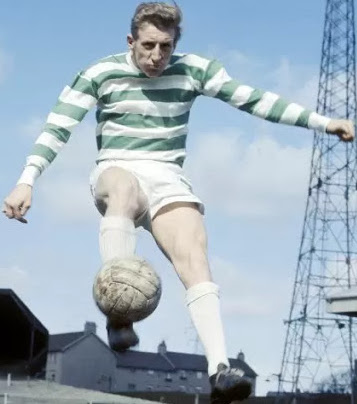
THE BIG SHOT…Tommy Gemmell is a high-flying pose to demonstrate his shooting power.
And everything looked to be going according to plan when Celtic were awarded a penalty-kick in the twenty-fifth minute after Bobby Lennox had been sent tumbling in the box. Tommy Gemmell fairly thrashed his effort wide of goalie Sandy Davie. It remained that way with the champions-elect strangely failing to ignite, despite the desperate and vocal exhortations from the terracings. The Tannadice men kept their powder dry until the fifty-fourth minute when, unusually, Billy McNeill and John Clark went walkabout and Billy Hainey got in behind the central defenders, drew Ronnie Simpson from his line, rounded the exposed keeper and stroked the ball unerringly into the vacant net. A hush greeted the goal.
However, the fans found their collective voice seven minutes later when Willie Wallace restored Celtic’s advantage. Centre-half Doug Smith and keeper Davie made a terrible mess of attempting to deal with a hanging cross into the box and the ever-alert Wallace seized on the loose ball to roll it home with ease. That was the signal for mass celebrating among the fans, but, astonishingly, United came back again to equalise. In the sixty-eighth minute, the home defence didn’t deal with a routine corner-kick and Dennis Gillsepie, who had scored at Tannadice in December, was allowed to run in uninterrupted to send a header flying past Simpson.
Once more, an unanticipated cloud of trepidation materialised over the ground. The supporters knew, though, that a point would still be good enough to win the title. Three minutes after Gillespie’s effort, Jackie Graham sneaked through to snatch a third for a United side who were refusing to follow the script. Celtic lost 3-2 for the second time to the same opponents and still required a point to make sure the flag would be flying over Parkhead at the start of the new season.
Tommy Gemmell had in interesting spin on the situation. ‘Ach, we weren’t too bothered. We knew the next game was against Rangers on the Saturday and we fancied winning the title at Ibrox. So, it wasn’t all bad. Mind you, I don’t think Big Jock shared my train of thought.’
Even before the United setback, the Celtic manager had been far from happy with the Scotland boss Bobby Brown and the Scottish Football Association selectors. Stein frowned after NINE players were brought into the international squad for a non-event friendly against the USSR at Hampden, scheduled for Wednesday May 10. Ronnie Simpson, Jim Craig, Tommy Gemmell, Bobby Murdoch, Billy McNeill, John Clark, Jimmy Johnstone, Willie Wallace and Bobby Lennox were all called up and that left Stevie Chalmers and Bertie Auld wondering if their aftershave had let them down.

Big Jock didn’t see the funny side. ‘We’re trying to win the European Cup for Celtic and also Scotland as a nation. My players need a rest, the last thing they require is an extra fixture during this month. Yes, it’s a compliment, I suppose, and my players have done well enough to be wanted to represent their country, but the timing is not good for us.’
Later in the evening, Stein and his players discovered who they would play for the right to be acclaimed the best team in Europe. Inter Milan and CSKA Sofia, two teams of contrasting pedigree but with the shared belief that dull defence was the foundation for success, had drawn 1-1 on aggregate in their semi-final. The Italians won the toss for the play-off to be staged in Italy and Renato Cappellini, who would have an interesting brush with Jim Craig later in the month, settled the outcome. The centre-forward headed the only goal of the game in the thirteenth minute and that allowed Helenio Herrera’s team to happily retreat into their defensive shell for the remaining seventy-seven minutes. It wasn’t enthralling or entertaining, but it was effective.
And the super-cool Herrera, immaculately-coiffured and expensively-dressed, took his front row seat at storm-lashed Ibrox Stadium on Saturday May 6 as Celtic set out to make history by lifting the championship at the ground of their greatest rivals. The bloated grey skies over Glasgow had burst from early morning and the torrential rain poured down vigorously, practically in rivulets, creating havoc with the electrics throughout the city and bringing the underground to a virtual standstill. Even the attendance was shy of the 90,000 anticipated with 78,000 fans in the stadium in time for kick-off. Various travel services had been severely curtailed during the freakish monsoon conditions.
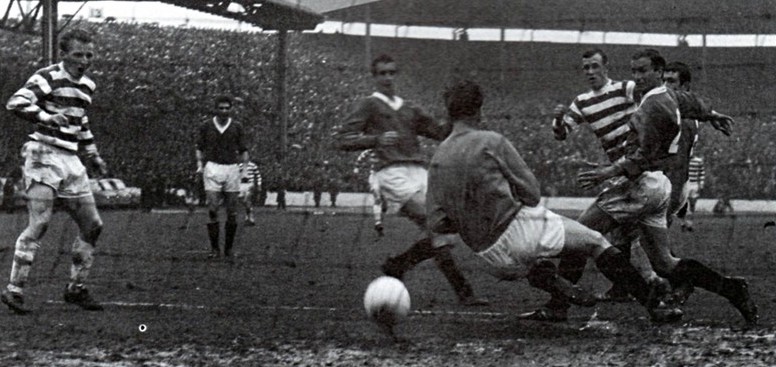
TOUCH WOOD…Bobby Lennox slides a close-range drive at goal with Norrie Martin attempting to save and Jimmy Johnstone lurking.
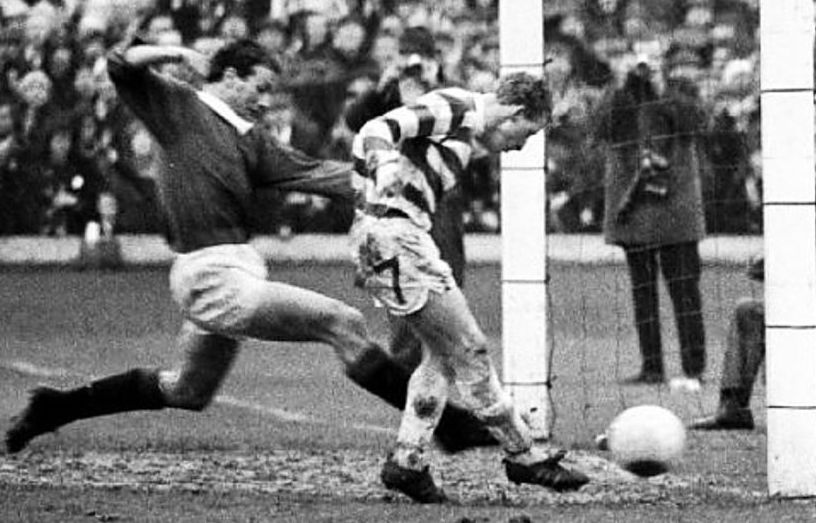
THE EQUALISER…Jimmy Johnstone punces ahead of Rangers defender Kai Johansen to thump the rebound into the net.
The Ibrox playing surface very swiftly resembled a quagmire. However, the underfoot swamp failed to prevent the players from both teams from serving up breathtaking entertainment with little Jimmy Johnstone taking top billing in a fascinating 2-2 draw where Celtic were a mere nine minutes away from their first league win in Govan in nine years.
Tommy Gemmell recalled, ‘Jinky was immense that day. What made the achievement even more remarkable was the fact the entire game was played in a downpour. The heavens opened and I’m fairly sure I saw a bloke in a large ark packed with animals floating past at one point! Jinky, though, was in his element. He should have disappeared in the mud, but he decided to turn it on. His shirt was drenched and sodden and falling off his shoulders, his boots were just about submerged in the glaur, but nothing was going to deter him taking centre stage. Up against him that afternoon was Davie Provan, who was a tall, rangy guy.
‘Helenio Herrera must have noted that the Rangers player was being torn apart by Jinky. Inside, outside, through his legs – it didn’t matter to the Wee Man. He was in the mood and he was unstoppable. The Inter Milan boss would have been wincing through the ninety minutes as he witnessed all this unfolding before his very eyes. Herrera was known as “The Magician” in Italy and I bet he wished he could somehow make the Wee Man disappear.
‘If he had arrived in Glasgow believing Jimmy Johnstone was merely a run-of-the-mill outside-right, then he got on his Milan-bound flight with different ideas. Jinky capped a wonderful display – easily one of the best I have ever seen by an individual player anywhere – with a soaring left-foot shot into the roof of the net from about twenty-five yards. Norrie Martin was in the Rangers goal that afternoon and he took off in determined fashion, but there was no way he was going to prevent that effort from rattling the rigging. By the way, I did say left foot. A lot of folk thought that was the one Jinky used for merely standing on, but, take it from someone who used to get tied in knots attempting to stop him in training, he could use both feet with equal ability.’

After his usual careful deliberation before any game, but particularly against Rangers, Jock Stein fielded the team he would choose to represent Celtic in the dramatically-changed circumstances of Lisbon later that month. He was resolute in his determination to clinch the club’s second successive championship at Ibrox.
Stein’s family were staunch Protestants from Burnbank and his father George was a fervent Rangers supporter. The family hoped Jock, a useful centre-half or left-half, would one day sign for the Ibrox side. That was the wish of his father. His son should play in the blue-red-and-white of Junior side Blantyre Vics before swapping it for the blue-red-and-white of Rangers. Jock, though, displayed an exceptional independent streak early in life. He was not rebellious and never displayed the slightest bit of curiosity concerning the religious divides of a small mining community, but, later in life, Jock Stein never made the slightest attempt to disguise the fact he thoroughly enjoyed beating Rangers.
In his usual forthright manner, Bertie Auld told me in ‘Celtic: The Awakening’, ‘Publicly, Big Jock would inform everyone that a meeting with Rangers was just another game. Privately, the players all knew just how much he enjoyed putting one over our old rivals. I would go as far as to say he detested Rangers. I don’t think that is too strong a word. He really disliked them.
‘We all knew his background, we realised where his roots lay, but we also saw him after a win over Rangers. You would have needed plastic surgery to get the smile off his face. We could beat any other team 2-0, 3-0, 4-0, you name it and we could still get a rollicking when we turned up for training on Monday. If he had seen something that upset him, irrespective of the winning margin, he would give us pelters. However, we could play awful, get a lucky goal and beat Rangers and we never heard a thing; not a murmur. Lose, though, and life wasn’t worth living.
‘He rarely, if ever, talked about the sectarian divide. He was a Protestant managing a club with Catholic origins and he had Protestant players such as Ronnie Simpson, Willie Wallace, Tommy Gemmell and myself playing for him. Religion didn’t come into it as far as he and Celtic were concerned. It did across the Clyde, though. For long enough Rangers would not sign a Catholic. It was well-known that they were put off signing a young player who would go on to become world class because of his name, Danny McGrain. If only they had known.
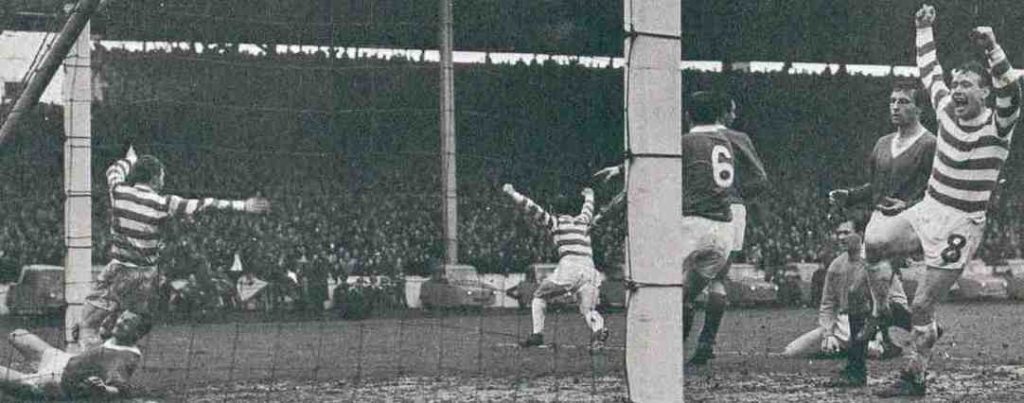
IBROX HAPPY DAZE…Jimmy Johnstone, Bobby Lennox and Willie Wallace dance in delight after the Hoops’ first goal.
‘Jock used to insist if there were two players of equal ability and one was a Catholic and one was a Protestant, he would sign the latter. He would say, “Well, Rangers can’t sign the Catholic, can they?” Sadly, that was the case back then. Jock found it extremely distasteful. In truth, though, he was only interested in a guy’s playing ability and not the school he had gone to. Maybe that fired him up just that little bit more for games against Rangers.’
John Fallon knew what it was like to be on the receiving end of Stein’s ire after underperforming in an Old Firm game. The goalkeeper, who had been a late replacement for Ronnie Simpson, lost two extremely soft goals in a 2-2 draw on January 2 1968, the second just one minute from time. ‘I must admit it was a howler,’ said Fallon. ‘After the game, Big Jock looked as though he wanted to strangle me.’
So, the Celtic manager would have been far removed from best pleased when Rangers scored their first goal against Celtic that season after their 4-0 trouncing in the Glasgow Cup, the 2-0 loss in the league at Parkhead and the 1-0 defeat in the League Cup Final at Hampden. At least, Ronnie Simpson wouldn’t be in the direct line of fire from Stein; there was little the veteran could do to repel Sandy Jardine’s right-foot twenty-yard thunderbolt as it crashed behind him, abruptly shaking loose a cascade of raindrops from the net at the same time.
The Ibrox players must have thought the strike had presented them with a half-time lead as it arrived in the forty-first minute. However, Celtic, displaying the qualities expected of genuine champions, equalised within sixty seconds. Bobby Lennox squeezed a low drive away from the sprawling Norrie Martin and then groaned in dismay as the ball collided with the far post. His disappointment dissipated in a heartbeat as Johnstone, lurking with intent and reacting more swiftly than the Rangers defence, plonked the rebound into the net.
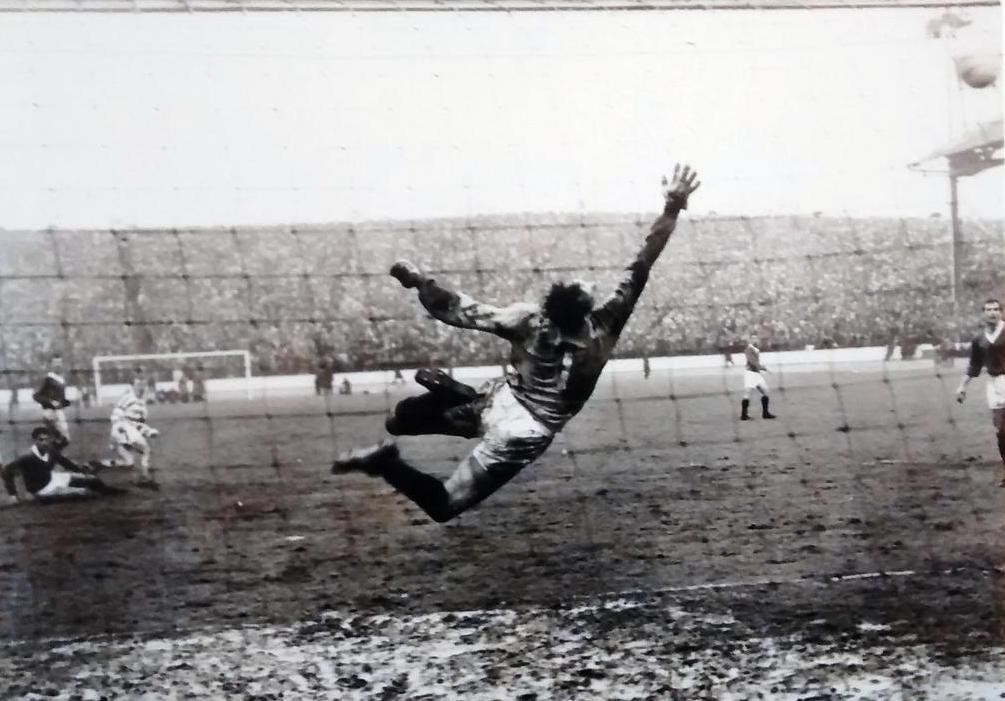
CRASH…Jimmy Johnstone sends in a scorching drive from outside the penalty area.
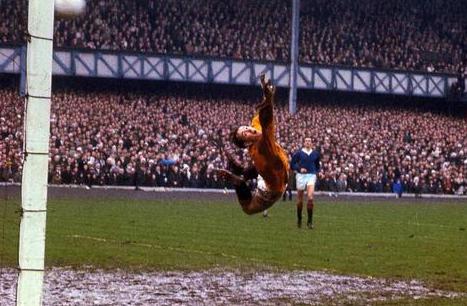
BANG…Rangers keeper Norrie Martin is beaten as Johnstone’s drive zeroes in on its destination.
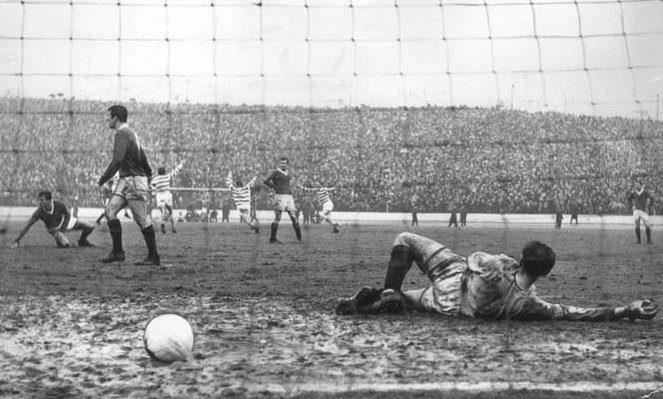
WALLOP…Martin lies helpless in the mud as the Celtic players celebrate.
In the seventy-fourth minute, Celtic’s miniature sorcerer conjured up an inspirational virtuoso moment that was immediately seared into the memory banks of anyone fortune enough to witness his generous gift of the extraordinary. The slight winger, after gliding on to a right-wing throw-in from Stevie Chalmers, somehow dredged himself across the soaking marsh with Rangers defender Davie Provan quite content to pass him inside onto his ‘weaker’ left foot. From somewhere within that slight frame, Johnstone found the reserves of strength to take a touch and then heave an utterly unstoppable shell high past Martin into the keeper’s top right-hand corner of his net.
He was immediately submerged by his delighted team-mates as the home defenders argued among themselves. They had just been in the presence of genius and had no need to attempt to apportion blame. Johnstone, swinging his arms like a happy schoolboy, trotted over to his outside-right berth as Rangers prepared to recentre the ball.
With time running out, Willie Henderson cut inside to drill a low shot across Simpson towards the far corner. The mud-spattered custodian got down to it in a flash, but, unhappily though, he couldn’t keep hold of the greasy ball and it squirmed loose into the tracks of Roger Hynd, a muscle-bound wing-half converted to centre-forward for this game, and he couldn’t fail to miss from four yards. Nine minutes later, referee Willie Syme, a match official who would never receive a Christmas card from Jock Stein, blew for time-up. Sportingly, John Greig, the despondent Rangers captain, was the first to congratulate Johnstone with Provan next in line. At least, they realised they had faced an irresistible force that damp day in Govan.
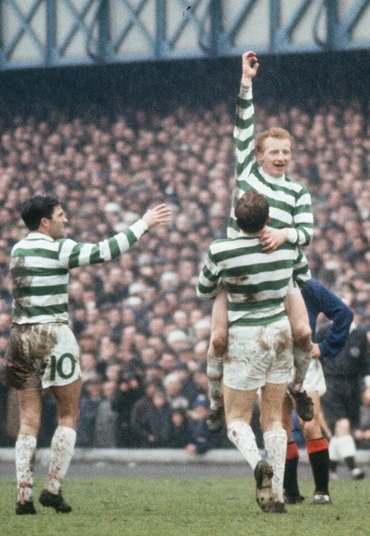
LIFT-OFF…Jimmy Johnstone is hoisted high by team-mate Tommy Gemmell as Bertie Auld joins in as he celebrates at Ibrox.
‘It was a strange sensation to win the league championship at Ibrox,’ recalled Gemmell. ‘Obviously, our supporters were showing their delight and, like Fir Park the previous season, we had made to make absolutely sure away from our own stadium. But I also remember the Rangers fans cheering well after the final whistle. No, they weren’t applauding us, but I think they were more than a little relieved they hadn’t seen their team turned over again. Besides, it was also the Ibrox side’s last domestic game of the season before they prepared for their Cup-Winners’ Cup Final against Bayern Munich. So, we had both sets of Old Firm fans happy at full-time – that had to be a first!’
There was no rest for the victorious and four days later six of the Celtic players who performed at energy-draining Ibrox were taking their place in the Scotland line-up to face the USSR at Hampden, the nation’s first international since beating England at Wembley almost a month beforehand. Bobby Brown selected Ronnie Simpson, Tommy Gemmell, Billy McNeill, John Clark, Jimmy Johnstone and Bobby Lennox to start the game while Willie Wallace replaced Manchester United maverick Denis Law at half-time. Sunderland’s Jim Baxter, who was captain for the night, Eddie McCreadie (Chelsea), Frank McLintock (Arsenal) and Jim McCalliog (Sheffied Wednesday) made up the remainder of the team.
A crowd of almost 53,500 turned out to see the visitors win 2-0 during a fairly lukewarm encounter with both goals scored in the opening half. It was evident it was no easy task to keep Gemmell out of the headlines even on tepid occasions such as this one. The rampaging full-back scored only two goals while representing his country on a mere eighteen occasions. One was a penalty-kick in an 8-0 runaway World Cup qualifying victory over Cyprus in 1969 – and the other was for the USSR.
Gemmell’s gaffe arrived in the sixteenth minute and, years later in his book ‘All The Best’, he told me, ‘I scored over sixty goals for Celtic – not all of them penalty-kicks, I hasten to add – and that’s not bad going for a left-back. However, while I was playing for Scotland, I only netted two. Embarrassingly, one of them was in my own net! And, even worse, it was against my old mate Ronnie Simpson. Honestly, you don’t need comedy scriptwriters in football. We’re all masters of improvisation. So, how did it come about? Sadly, I can’t even blame the conditions at Hampden on that sunny Wednesday evening.
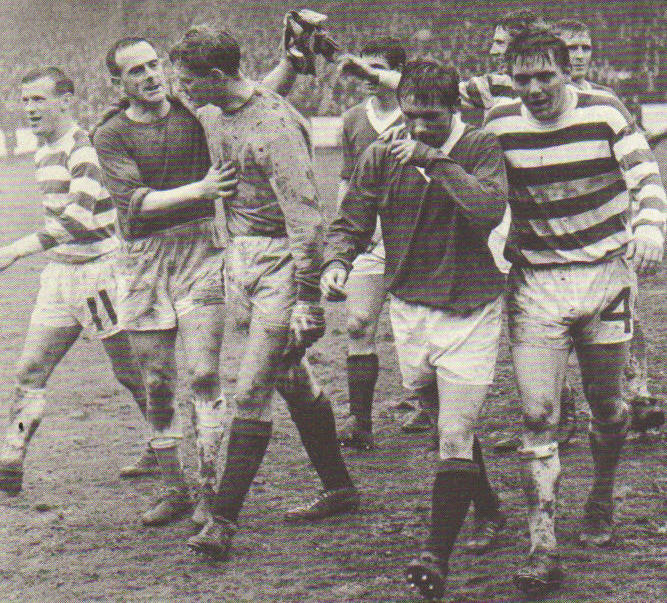
MUD, MUD, GLORIOUS MUD…Ronnie Simpson commiserates with his opposite number Norrie Martin as the players come off the Ibrox pitch – and the title is heading once aagain to Parkhead for a second successive season.
‘Our opponents didn’t need a helping hand with players such as Albert Shesternev – known as “Big Al” during the World Cup Finals in England the previous year – Josif Sabo, Valerij Veronin, Igor Chislenko and Eduard Malofeyev in the team. They also had one of the greatest goalkeepers of all time gracing Glasgow that night, the legendary Lev Yashin, known as the Black Octopus. He was the first goalie to wear an all-black kit that so many others copied in the sixties. Octopus? Well, he seemed to have more arms than was considered the norm. Yashin was at the veteran stage at that time and it must have been a rare occasion when my old mate Ronnie wasn’t the oldest man on the pitch. Ronnie was thirty-six years old and his Soviet counterpart was a year his senior.
‘Well, how did my mishap occur? Good question. I blame Ronnie! There were only sixteen minutes gone when I was tidying things up at the back. The game had started off at a genteel pace and maybe I was a bit slow to get into the flow. Anyway, without even looking over my shoulder, I turned to flick a high pass back to our keeper. Imagine my horror, then, when I heard a howl from the Hampden terracings and I swiftly looked round. Ronnie, for whatever reason, had wandered onto his eighteen-yard line. I turned to see our keeper scampering back trying to catch the ball as it sailed serenely into our net.
‘I looked at Ronnie and said, “For fuck’s sake, why didn’t you give me a shout? Why weren’t you on your line, you old bastard?” That, you should know, was a term of endearment. Ronnie was always good at returning fire. “Why the hell didn’t you look where you were putting the ball?” Thankfully, the goalie could get his point across, but he was never a big curser. Mind you, he might not have been too delighted when I said, “Faither? You should be known as Grandfaither after that goal!”

‘It didn’t get any better when Fedor Medved netted another just before the interval and that’s the way the scoreline finished. We had beaten England 3-2 at Wembley the previous month and, quite possibly, we had gone well into overtime indulging that success. I also had to face the wrath, not only of Ronnie, but also another five of my Celtic colleagues who had figured in the game – Billy McNeill, John Clark, Jimmy Johnstone, Bobby Lennox and Willie Wallace. We all had better fortune, I seem to remember, in a club game that was played in Portugal fifteen days later.
‘At the end of the match, there was the usual scrum of newspaper reporters waiting to talk to the players. They selected me for the main question. They chorused, “What on earth were you thinking about at the own goal?” I had to think fast. I answered, “I looked up and saw an old guy coming out of goal and I thought it was Lev Yashin, so I decided to lob him.” I don’t think anyone bought into that.
‘My other goal while representing my country was hardly memorable, but, at least, it was for Scotland! There is a good story about it, too. We were strolling to a 7-0 World Cup qualifying rout over Cyprus when we were awarded a penalty-kick with only fourteen minutes to go. Colin Stein, the Rangers striker, was on fire at Hampden that May afternoon in 1969. He had rattled in four goals in the space of thirty-nine minutes and was doing his utmost to beat Denis Law’s Scottish international record. The Lawman had scored foursomes in games against Northern Ireland in 1962 and Norway a year later. The bold Colin wanted to go one better and grabbed the ball as soon as the referee pointed to the spot. It was natural enough for an in-form hitman to want to take the award. In fact, the penalty was given at what was commonly known as the Rangers End of the national stadium and the fans in there behind that goal were chanting for their Ibrox hero to have a go.
‘No chance! I was the designated penalty-taker for the team and the onus was on me. Colin could plead all he liked, I was taking that spot-kick. A Celtic player allowing a Rangers player overtake a legend like The Lawman? Sorry, Colin, it was never going to happen. I put the ball on the spot and I did what I always did. I smashed it as hard as I could in the direction of the goal and hoped for the best. It flew into the net and that completed the scoring. Colin looked a bit miffed at the end. The Cypriot keeper’s name was Michalaikis Alkiviadis and someone should tell him he was in legendary company. He became only the second goalkeeper, along with the icon that was Ronnie Simpson, I scored against in an international. That would have been something to tell his grandkids!’
Bill Anderson was the referee who brought the league season to a jubilant finale at Parkhead when Celtic beat Kilmarnock 2-0 on Monday May 15 – coincidentally the same match official who had activated the glorious campaign against Manchester United on August 6 the previous year. Helenio Herrera took the precaution of sending a platoon of spies to the game and they must have been more than a tad perplexed to see someone by the name of John Cushley playing at centre-half and another unknown in John Fallon performing in goal. Jock Stein was up to his old tricks and he even fielded skipper Billy McNeill wearing No.8. The Celtic players, with a second successive crown safely deposited in the Parkhead trophy room, were warned by their manager against turning in a self-congratulatory performance against Kilmarnock. ‘Time enough for all that stuff at the end of the season,’ he barked at the conclusion of his pre-match team talk.
Cushley, with West Ham manager Ron Greenwood, a friend of Stein, watching from the stand, played his one and only game for Celtic in their campaign of splendid triumph as they eased to victory with goals in each half from Bobby Lennox and Willie Wallace in front of 21,000 fans. A month later, the dependable Cushley, an uncomplaining understudy for McNeill, joined the London side for £25,000.
Coincidentally, he would team up with goalkeeper Bobby Ferguson, who was also making his last appearance for Kilmarnock before his £65,000 switch to Upton Park. The goalie, who had lost his international place to the redoubtable Ronnie Simpson, had no chance when Lennox ran onto a Wallace lob to thump in the first goal in the twenty-fifth minute and it was an identical story midway through the second-half when Wallace controlled a Bobby Murdoch lobbed pass with his back to goal, pivoted and then blasted in an unstoppable effort.
All that was left was for the Celtic players to hoist a reluctant Jock Stein onto their shoulders and parade him in front of the delighted support. And then the thoughts turned to Lisbon.
TOMORROW: HAIL! HAIL! THE CONQUERORS ARE HERE!

